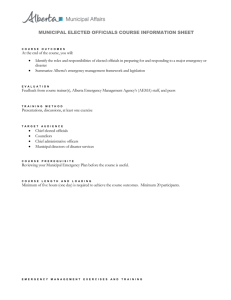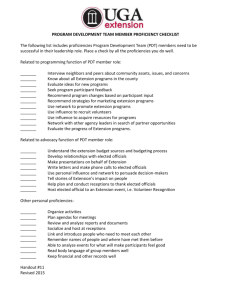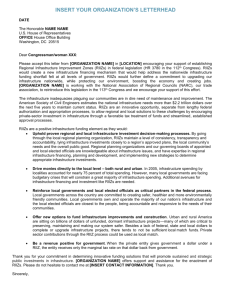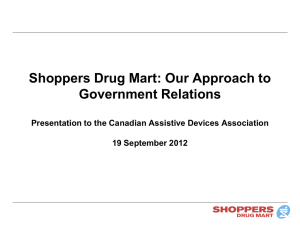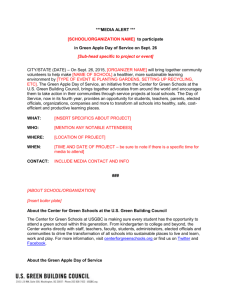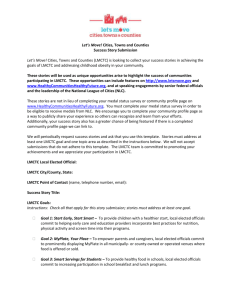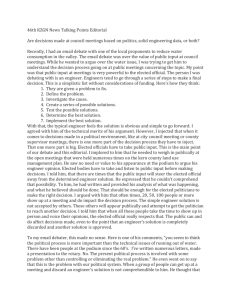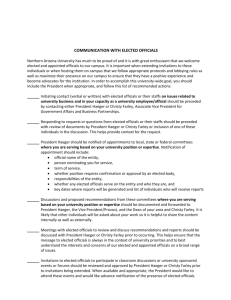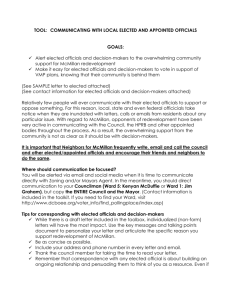8-36_ADA50_Political_Influence_RNS
advertisement
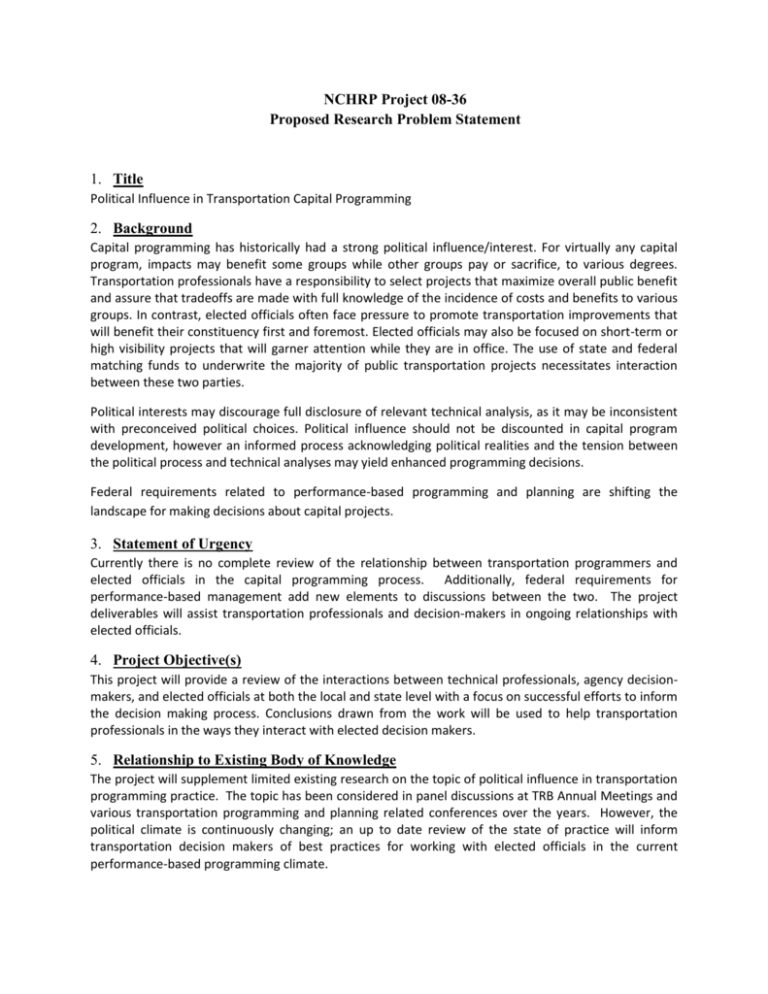
NCHRP Project 08-36 Proposed Research Problem Statement 1. Title Political Influence in Transportation Capital Programming 2. Background Capital programming has historically had a strong political influence/interest. For virtually any capital program, impacts may benefit some groups while other groups pay or sacrifice, to various degrees. Transportation professionals have a responsibility to select projects that maximize overall public benefit and assure that tradeoffs are made with full knowledge of the incidence of costs and benefits to various groups. In contrast, elected officials often face pressure to promote transportation improvements that will benefit their constituency first and foremost. Elected officials may also be focused on short-term or high visibility projects that will garner attention while they are in office. The use of state and federal matching funds to underwrite the majority of public transportation projects necessitates interaction between these two parties. Political interests may discourage full disclosure of relevant technical analysis, as it may be inconsistent with preconceived political choices. Political influence should not be discounted in capital program development, however an informed process acknowledging political realities and the tension between the political process and technical analyses may yield enhanced programming decisions. Federal requirements related to performance-based programming and planning are shifting the landscape for making decisions about capital projects. 3. Statement of Urgency Currently there is no complete review of the relationship between transportation programmers and elected officials in the capital programming process. Additionally, federal requirements for performance-based management add new elements to discussions between the two. The project deliverables will assist transportation professionals and decision-makers in ongoing relationships with elected officials. 4. Project Objective(s) This project will provide a review of the interactions between technical professionals, agency decisionmakers, and elected officials at both the local and state level with a focus on successful efforts to inform the decision making process. Conclusions drawn from the work will be used to help transportation professionals in the ways they interact with elected decision makers. 5. Relationship to Existing Body of Knowledge The project will supplement limited existing research on the topic of political influence in transportation programming practice. The topic has been considered in panel discussions at TRB Annual Meetings and various transportation programming and planning related conferences over the years. However, the political climate is continuously changing; an up to date review of the state of practice will inform transportation decision makers of best practices for working with elected officials in the current performance-based programming climate. Existing literature includes: Domestic: Ellis, J A; BROOKS, R. Politics Takes a Toll. Infrastructure Finance, Institutional Investor, Incorporated, Volume 4, Issue 4. (1995). Humphrey, T F. Evaluation Criteria and Priority Setting for State Highway Programs. NCHRP Synthesis of Highway Practice, Transportation Research Board, Issue 84. (1981). Jimenez, Benedict S; Pagano, Michael A. What Factors Affect Management Quality? State Infrastructure Management and the Government Performance Project. Public Works Management & Policy, Volume 17, Issue 2. (2012). McCarron, John. Reverse Gears: A New Reality for Public Works?. Planning, Volume 77, Issue 2. (2011). Turnbull, Katherine F. Key Issues in Transportation Programming: Summary of a Conference. Transportation Research Board Conference Proceedings, Issue 43. (2008). Turochy, R E. Prioritizing Proposed Transportation Improvements: Methods, Evaluation and Research Needs. Transportation Research Record, Transportation Research Board, Issue 1777. (2001). Wang, Y. The Importance of Politics in Engineering: Lessons from a Hands-on Experience. Leadership and Management in Engineering, American Society of Civil Engineers, Volume 2, Issue 3. (2002). International: Siipo, J. Management of an Infrastructure Project – Politics and Engineering. Tiehallinnon Selvityksla, Finnra Reports, Finnish Road Administration, Volume TIEH 3200866, Issue 16. (2004). Storbjoerk, S. At the Cross-Roads: The Environmental Issue, Subpolitics and the Practice of the Ideal Planning in the Case of Arterial Road 50. Linkoeping Studies in Arts and Science, Linkoeping University, Institute of Tema Research, Issue 230. (2001). 6. List of Anticipated Work Tasks This research project would consist of a series of elements or case studies that highlight interaction between transportation professionals and elected officials in the capital programming process. The tasks to be performed include, but are not limited to, reviewing current successful practice, processes and emerging initiatives related to: Informing the political decision-making process. Successfully integrating technical data, performance measurement and evaluation with the political process. Exploring how interactions are similar or different at different levels of government (e.g. MPOs and local governments; state DOTs and state legislatures). Examining the extent to which programs based on the application of technical analysis and evaluation and a clear, public process are communicated to political officials. Reporting on the extent to which MPO board, state transportation commissions, etc., are comprised of elected officials and their turnover rates. Examining communication strategies employed by transportation professionals to educate elected officials The project will also identify areas of future research and needs, such as: Data gaps encountered. Research needs identified. Agency coordination requirements necessary to successfully influence the political process. The results of the research tasks will be assembled into a “practice ready” document providing best practices guidance to report on successful approaches to developing technically sound and politically acceptable transportation programs, to enhance communications between practitioners and elected officials, and to identify hurdles that might arise and identify techniques to overcome these hurdles. 7. Estimate of Funds Needed $100,000 8. Estimate of Time Needed to Complete the Research 12 months 9. Name, Affiliation and Contact Information of Submitter(s) Stephanie Everett Purdue University Email: stephanie.r.everett@gmail.com Phone: 407-718-1274 10. Date of Submittal June 18, 2014
